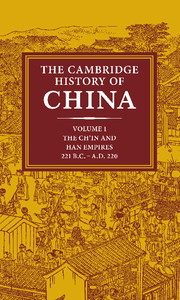Book contents
- Frontmatter
- Introduction
- 1 The state and empire of Ch'in
- 2 The Former Han dynasty
- 3 Wang Mang, the restoration of the Han dynasty, and Later Han
- 4 The conduct of government and the issues at stake A.D. 57–167
- 5 The fall of Han
- 6 Han foreign relations
- 7 The structure and practice of government
- 8 The institutions of Later Han
- 9 Ch'in and Han law
- 10 The economic and social history of Former Han
- 11 The economic and social history of Later Han
- 12 The religious and intellectual background
- 13 The concept of sovereignty
- 14 The development of the Confucian schools
- 15 Confucian, Legalist, and Taoist thought in Later Han
- 16 Philosophy and religion from Han to Sui
- Bibliography
- Glossary-Index
- Map 7 The Han empire, 143 b.c.
- Map 8 The Han empire, 108 b.c
- Map 9 The Han empire, a.d. 2
- Map 12 The Han empire, a.d. 140">
- References
9 - Ch'in and Han law
Published online by Cambridge University Press: 28 March 2008
- Frontmatter
- Introduction
- 1 The state and empire of Ch'in
- 2 The Former Han dynasty
- 3 Wang Mang, the restoration of the Han dynasty, and Later Han
- 4 The conduct of government and the issues at stake A.D. 57–167
- 5 The fall of Han
- 6 Han foreign relations
- 7 The structure and practice of government
- 8 The institutions of Later Han
- 9 Ch'in and Han law
- 10 The economic and social history of Former Han
- 11 The economic and social history of Later Han
- 12 The religious and intellectual background
- 13 The concept of sovereignty
- 14 The development of the Confucian schools
- 15 Confucian, Legalist, and Taoist thought in Later Han
- 16 Philosophy and religion from Han to Sui
- Bibliography
- Glossary-Index
- Map 7 The Han empire, 143 b.c.
- Map 8 The Han empire, 108 b.c
- Map 9 The Han empire, a.d. 2
- Map 12 The Han empire, a.d. 140">
- References
Summary
SOURCES
According to tradition, codified law existed in China from a rather early date. A penal code may have been available at least since the eighth century before the beginning of our era. It seems logical to connect this codification with the growth of the large centralized states – which gradually came to replace the multitude of small, archaic states – and the development of a true bureaucracy in these new political entities. However, with one notable exception, these codes, as well as the codes of the later empires, have been mostly lost. The earliest code we possess in its entirety is the T'ang penal code of 653 in its revised version of 725, and hundreds of T'ang administrative rules. Most of what we know of the law of the earlier period has been gathered from quotations and other information contained in historical and literary works and, to a certain extent, from inscriptions and from documents discovered by archeologists. In this way, we possess a number of quotations from the earlier laws and a considerable body of case law. Except for the recently discovered collection of part of the Ch'in laws, Our main sources are the histories devoted to the succeeding dynasties which ruled over the whole or over different parts of China after 202 B.C.; especially important are the treatises on penal law in several of these histories, which contain the most important codifications and revisions during the period under survey, as well as extracts of discussions and of notable cases These historical works are the Shih-chi (Historical records), by Ssu-ma Ch'ien (ca. 100 B.C.), the Han shu (History of the Former Han dynasty), by Pan Ku (A.D. 32–92), the Hou-Han shu (History of the Later Han dynasty), by Fan Yeh (398–436), and a number of later works.
- Type
- Chapter
- Information
- The Cambridge History of China , pp. 520 - 544Publisher: Cambridge University PressPrint publication year: 1986
References
- 5
- Cited by



